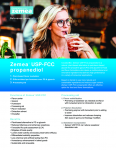Judge throws out lawsuit alleging HFCS caused girl’s type 2 diabetes

In his April 21 order on the suit, filed against leading corn refiners including ADM, Cargill, Ingredion, Tate & Lyle Ingredients Americans, and Roquette America, US district judge William M. Skretny said the plaintiff had not proved that the teen's diabetes was caused by HFCS and rejected the allegation that HFCS is unreasonably dangerous.
He added: “Plaintiff brings causes of action for negligence, design defect, and failure to warn against several makers of high-fructose corn syrup. Each of those claims, however, must be dismissed for several reasons, including Plaintiff’s failure to plead that HFCS is unreasonably dangerous and her failure to connect her disease to the actions of any one defendant.”
Plaintiff alleged that teenager developed diabetes as ‘a direct and proximate result of the defendants’ actions’
The original complaint, filed in June 2013 by plaintiff S.F (the mother of S.E.F. - a 14-year-old girl) alleged that corn refiners were selling a product they knew to be “dangerous, life-threatening and a cause of type 2 diabetes”.
The plaintiff, who sought damages of $5m, claimed that "HFCS is a toxin" and argued that "since 1970, coinciding with the advent and increasing and pervasive commercial use of HFCS, type 2 diabetes rates in the United States have skyrocketed."
She added: “As a direct and proximate result of the Defendants actions, the Infant Plaintiff, S.E.F., has sustained severe and serious permanent injuries including type 2 diabetes.”
The defendants also had a duty to warn consumers of the “latent dangers” arising from consuming HFCS “including development of type 2 diabetes”, she claimed.
However, the defendants argued that the plaintiff had not supplied any credible evidence that consuming HFCS was a significant factor in the teenager’s diabetes.
Corn Refiners Association (CRA) president John Bode said he was pleased the “meritless” suit had been dismissed, adding: “Years of scientific research have shown that HFCS is nutritionally equivalent to other sugars, safe, and does not uniquely contribute to diabetes or obesity."
CRA: Years of scientific research have shown that HFCS is nutritionally equivalent to other sugars
Critics of HFCS claim that it increases fat levels in the liver and muscle tissue, increasing the risk of non-alcoholic fatty liver disease and contributing to insulin resistance, a key factor in the development of type 2 diabetes.
They also argue that while HFCS and sucrose each contain similar amounts of glucose and fructose, they are metabolized differently because the fructose and glucose in sucrose is joined by a covalent bond.
However, many studies supporting this hypothesis subjected volunteers to unrealistically high levels of fructose or had subjects consume fructose independent of glucose, which is not how fructose is consumed in the daily diet, claims the CRA.
Meanwhile, the bond joining fructose and glucose in sucrose is broken by digestive enzymes as soon as sucrose hits the small intestine, which means sucrose is metabolized as free fructose and free glucose, exactly the same way that HFCS is, it claims.
As for the correlation between rising consumption of HFCS and rising rates of obesity/diabetes alleged in the lawsuit, intakes of HFCS have in fact declined in recent years while obesity and diabetes rates continued to rise, while obesity/diabetes is also a problem in countries such as the UK and Australia where little or no HFCS is consumed, says the CRA.





















